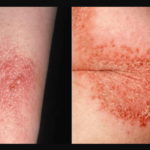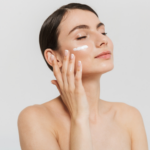There are many types of skin oils available; however, two of the most common are jojoba oil and almond oil.
Natural oils like jojoba oil and almond oil not only have healing qualities but can improve your skin complexion exponentially. These oils hydrate your skin leaving your complexion youthful and radiant.
What are the differences between the two oils? Both jojoba oil and almond oil absorb into the skin quickly. Almond oil contains more monounsaturated fatty acids, so it is intensely moisturizing and saturates into the skin deeper.
Jojoba oil is a liquid wax ester extracted from the seed, so it hydrates the skin and leaves a thin waxy seal on the surface.
Jojoba oil and almond oil can be used alone or as carrier oils to be mixed in with other essential oils and ingredients like mango butter for any homemade skin care formula suitable for your specific skin type or condition.
Which oil to choose for your daily skin care regimen? Let’s discuss the merits of jojoba oil and almond oil.
Choosing the right oil depends on your skin type and how your skin reacts to the oil. Almond oil is a natural moisturizer and saturates deep into the skin due to its high content of monounsaturated fatty acids.
It should be noted; however, that almond oil may not be suitable for you if you have an allergic reaction to nuts.
Jojoba oil regulates the natural production of oil on your skin and is, therefore, beneficial for those with oily scalp and complexion.
Also, for an excellent cream, take a look at our top pick, the BABOR ReVersive Pro Youth Cream Rich:
Click here to see it on Amazon.
Jojoba Oil Vs. Almond Oil for Skin
Jojoba oil is not a typical oil; rather, it is a liquid wax ester extracted from the seeds. It is similar to human sebum and balances the production of sebum by reducing or increasing the human body’s natural oils on the skin surface.
This oil is not only commonly used in shampoos and cosmetics but can be used on its own as a topical oil to treat acne, eczema, psoriasis and also soothe sunburn and razor burns. It also helps with hair regrowth and control dandruff as the oil moisturizes the scalp preventing dryness of the scalp.
Jojoba oil is the most versatile oil in that it is suitable for almost all skin types and skin tones and contains high amounts of Vitamins E and B complex. It is especially suitable for you if you are prone to acne or have oily skin.
Jojoba oil hydrates the skin, is non-greasy and gets absorbed into the skin very quickly, and is perfect for daily cleansing and moisturizing routines. It is a gentle oil that makes it possible to mix it with other essential oils.
Unlike other essential oils, you can apply jojoba oil directly onto your skin without having to dilute it.
Almonds are not nuts but rather seeds of the almond fruit and have always been considered a healthy food. Almond oil is high in Vitamins E and A and contains the highest monounsaturated fatty acids compared to other oils.
Almond oil helps to keep your skin naturally hydrated. It is a natural moisturizer and gets absorbed deep into the skin, which makes it an excellent oil for skin reparation and dry, itchy, flaky skin.
It is also believed that almond oil may help with reducing pregnancy stretch marks and scarring, especially after surgery. This oil helps to protect the skin from the elements like wind and pollutants in the environment and also repair UV damage.
Benefits of Jojoba Oil for Skin

Research has indicated that jojoba oil has many benefits not only for a daily skin care regimen but also for many other skin problems and conditions. Jojoba oil is rich in Vitamin E, B complex, and minerals and has a myriad of uses.
Jojoba oil is “non-comedogenic” in that the oil is very similar to the sebum produced by your body, which means that it helps prevent oily skin, as well as keeps your pores from clogging and forming acne.
The oil is deeply moisturizing, acting as a barrier to keep your skin from losing moisture and becoming dry, thus preventing the formation of acne and dandruff. It contains antimicrobial and antifungal properties and kills certain bacteria and fungi that cause candida, E. coli, and salmonella.
Research shows that jojoba oil has natural properties that enable skin cells to speed up the healing process and might also reduce scarring. Studies also show that anti-inflammatory and natural healing properties present in jojoba oil helps in the treatment of eczema, psoriasis, flaking, itching, and other dry skin conditions.
Jojoba oil is a liquid wax ester, and although the oil is absorbed in the skin, the waxy texture creates a sort of seal on the skin’s surface, which makes the oil hypoallergenic and is why irritations and allergic reactions are extremely rare.
The rich source of Vitamin E in jojoba oil makes it a natural antioxidant, enabling your skin to combat exposure to pollutants and toxins in the environment.
Studies also indicate that vitamin E, together with other antioxidants present in jojoba oil, makes it a natural sunscreen. The antioxidants also help the body to produce collagen, which slowly decreases with age.
Jojoba oil is rich in vitamins and minerals like vitamin C, vitamin B, vitamin E, copper, and zinc that strengthens and nourishes hair, prevents hair loss, and promotes hair thickness.
The minerals present in jojoba oil may also slow down aging, help decrease wrinkles and fine lines from appearing, and maintaining healthy and youthful skin and complexion.
As jojoba is a very stable oil, it has a longer shelf-life compared to other oils and, therefore, may retain its benefits for a much longer period.
Try the Koh Gen Do Oriental Plants Lotion for a moisturizer that feels simply amazing on the skin. It has 36 botanical ingredients, including the wonderful jojoba oil to not just moisturize but also reduce signs of aging.
Click here to see it on Amazon.
Benefits of Almond Oil for Skin

A recent study indicates that almond oil keeps your skin completely hydrated as it is highly emollient, which helps your skin to retain its moisture.
Therefore almond oil is commonly used in lip care as it is very effective for chapped lips. Almond oil is an extremely nourishing oil and has many other uses and benefits, such as repairing split ends in your hair, protecting your skin from the polluted environment, UV damage, and the elements like the wind.
The high vitamin A content in almond oil helps prevent acne from forming by dislodging clogged pores and hair follicles. It also repairs and clears dead skin cells effectively, and its antibacterial properties are very effective in treating acne.
You can apply the oil directly to treat dark spots and marks and under the eye area. It can also be applied to get an even skin tone and is very effective for removing makeup and as a massage oil as it absorbs into the skin very easily.
This oil is rich in biotin (vitamin B7), which helps to soften, nourish and strengthen your hair and nails and also protects hair from UV damage with a natural SPF5. It can also smooth frizzy hair and heal damaged hair.
Its antibacterial and fungicidal properties make it an effective scalp treatment by hydrating the scalp and cleaning hair follicles to keep dandruff in check. It also has very little or no scent, which makes it very suitable to use on the hair.
Almond oil is high in Vitamins E and A and has the highest concentration of monounsaturated fatty acids compared to other oils.
This means that it moisturizes intensely, providing relief to dry, itchy and dehydrated skin. Vitamin A aids in the anti-aging process, and vitamin E is very soothing for skin problems.
The vitamin E in almond oil also helps to soften fine lines and wrinkles, giving your complexion a more youthful appearance. This oil is also believed to aid in reducing stretch marks after birth and scarring.
For centuries almond oil has been used to treat minor wounds and cuts. In ancient Chinese and Ayurvedic practices, it is used to treat skin conditions like eczema and psoriasis.
It also has strong antifungal properties and can prevent athlete’s foot or help remove other fungal infections like ringworm.
My favorite skin care product with almond oil is the ELEMIS Pro-Definition Night Cream.
Click here to see it on Amazon.
This powerful night cream contains a ton of beneficial ingredients, including sweet almond oil, other plant oils, and vitamins. It plumps, nourishes, hydrates, and firms the skin each night.
Which is Better: Jojoba Oil or Almond Oil?
Both oils are excellent for the skin, but they have slightly different characteristics and benefits. Jojoba oil is more effective and suitable for quick treatments, while almond oil is more reparation with longer treatment.
Both oils share some similar healing and health benefits and can be used in your daily skin care routines, and they can be absorbed by the skin easily and quickly.
Jojoba and almond oil both contain extremely high moisturizing capabilities; however, the almond oil moisturizes far more intensely than jojoba oil.
While almond oil contains vitamin A, both oils contain vitamin E however, the vitamin E content in jojoba oil is very high and rich. Jojoba oil also contains other natural properties, minerals, antioxidants, antimicrobial and antifungal properties, anti-inflammatory and natural healing properties.
Choosing the right oil depends on your skin type, skin condition, and how your skin or hair reacts best to your choice of oil. It also depends on whether you have an allergic reaction to the oil.
Jojoba oil is hypoallergenic, and both oils are natural. You can use both oils in rotation, perhaps using one oil in the daytime like jojoba oil as it has sunscreen properties and antioxidants, and use the other oil the other at night. You can also mix the oils with other carrier oils.
Conclusion – Jojoba Oil Vs. Almond Oil
In conclusion, whether you choose jojoba oil or almond oil, you can’t really make a wrong choice as they both have healing properties and can only improve your skin complexion and natural treatment of your skin problems.
They are non-toxic and do not contain any harmful ingredients. Jojoba oil and almond oil has multipurpose uses. You can use it as part of your beauty routine, on your hair, for skin treatments, and healing purposes.




![Neutral Skin Tone Defined [and Best Colors for Neutral Skin] neutral skin tone](https://skincaregeeks.com/wp-content/uploads/2021/05/neutral-skin-tone-150x150.png)







